Red-Headed Woman preposterous, over-sexed trash, but wildly entertaining because of those exact reasons. Harlow finally found a niche for her explosive sexual charisma: comedy. Yes, Red-Headed Woman is a black comedy, of sorts, about a woman who sees nothing wrong about sleeping her way into the upper-echelon of society and promptly moving on to her next victim/lover when things don’t go her way. And, in the end, she doesn’t get her comeuppance or learn a lesson in morality. Only in Pre-Code Hollywood could a character like Lillian "Red" Andrews force the world into conforming to her whims and winning our sympathies.
But only Harlow, who in real-life was a traditional mama’s-girl, could invest her cheerfully amoral gold-digger with a heart and, gosh darn it, she’s kind of likeable. Even if it’s only because we can’t believe her actions, and how she doesn’t even care who she has to hurt to accomplish her goals or the consequences of her actions, so we stare mouth agape at her sociopathic, kinky social climber. It helps tremendously that Harlow always enters the frame in glamorous sex goddess mode before opening her mouth and proving to be a more oddball creature by the minute. Once she starts tossing off acidic one-liners with her bullhorn voice, it crystallizes the reason that she's considered one of the all-time great movie stars.
And, oh yeah, there’s some seriously kinky shit going on in this film. Harlow’s character gets slapped around and the only thing she can say in response is “Do it again! I LIKE IT!” For a moment Red-Headed Woman turns into a Pre-Code version of Blue Velvet. Of course such a fetishistic performance launched her into super-stardom, and thanks to Harlow playing it mostly for laughs Red-Headed Woman wills itself into being a semi-classic, albeit a trashy, crass one. Not unlike the film’s, uhh, heroine…?
Red-Headed Woman
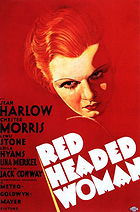 Posted : 13 years, 6 months ago on 28 November 2011 04:01
(A review of Red-Headed Woman (1932))
Posted : 13 years, 6 months ago on 28 November 2011 04:01
(A review of Red-Headed Woman (1932)) 0 comments, Reply to this entry
0 comments, Reply to this entry
A Woman's Face
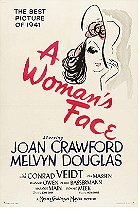 Posted : 13 years, 6 months ago on 28 November 2011 04:00
(A review of A Woman's Face)
Posted : 13 years, 6 months ago on 28 November 2011 04:00
(A review of A Woman's Face)Joan Crawford was a movie star who radiated a sense of authority, she was more overtly masculine than most of her male co-stars. Hers was an indomitable will and personality that was not going to back off for anyone or anything. And there was always the barely concealed rage. She was often a frothing, rabid uncaged animal that was ready to pounce on the first object to come into its line of vision. And it seems so obvious that much of this was a mask for a neediness and vulnerability. She was bound and determined to be loved, adored and to succeed, at any and all costs.
A Woman’s Face externalizes her interior wounds and psychological scars in a horrible disfigurement on the right side of her face. And George Cukor effectively reigns her in, makes her frequently drop the glamorous suffering and movie star posturing that marked much of her work. What we are left with is a performance that’s vulnerable and gives a context to her desperate neediness, rage and overtly masculine compensation tics. (Until she gets her face restored, and some of Crawford’s melodramatic tics come roaring right back.)
The first half of A Woman’s Face is, by a wide margin, the more successful film. The second half feels like a totally separate film with the flimsiest of connective tissue between them. In the first half, Crawford plays a woman who has allowed her disfigurement to turn her self-worth into a wilting flower. And it’s this sense of wilting and rotting in her that causes her to take that anger out on the world. Because of the gaping emotional wounds inside of her psyche, she has become a blackmailer and a criminal. Her slanted hat or a cascade of ebony hair to hide her scar proves to be her armor.
In the second half, Melvyn Douglas plays the plastic surgeon who fixes her face, restoring her beauty and wondering what he has unleashed. Now that her face has been cured, so has all of the rot and rabid animal ferocity within her character as well? She awakens from her makeover deciding that she’s now a good person and wants a fresh start as a governess. The problem here isn’t that her character wants to remake her life, that’s a given, it’s that the anger is no longer there. It’s during this section that Cukor loses some of his stranglehold on Crawford’s performance and she indulges in her worst mannerisms and lazy shorthand.
In small doses, like when Conrad Veidt, playing his character like a poisonous snake slowly toying with Crawford before going in for the kill, tries to get her to murder the child she’s in charge of, she unleashes. But there’s never a moment when we’re satisfactorily told or allowed to enter into her emotional terrain. She’s finally been granted a chance to look normal, and how does this new physical appearance affect her psychologically? Does she recognize herself?
But it’s still mostly successful as an examination of one of Cukor’s favorite themes: the exterior and interior coming into direct conflict. The first half is a must-see, and one wishes that they had followed through with that film’s promise. The second half is just a well-made melodramatic Crawford star vehicle. And extra praise should be given to Cukor for wringing such a nuanced and melancholic performance out of Crawford, truly this is one of her best. Possibly even better than what her fans consider her holy trinity -- Mildred Pierce, Possessed and Humoresque.
A Woman’s Face externalizes her interior wounds and psychological scars in a horrible disfigurement on the right side of her face. And George Cukor effectively reigns her in, makes her frequently drop the glamorous suffering and movie star posturing that marked much of her work. What we are left with is a performance that’s vulnerable and gives a context to her desperate neediness, rage and overtly masculine compensation tics. (Until she gets her face restored, and some of Crawford’s melodramatic tics come roaring right back.)
The first half of A Woman’s Face is, by a wide margin, the more successful film. The second half feels like a totally separate film with the flimsiest of connective tissue between them. In the first half, Crawford plays a woman who has allowed her disfigurement to turn her self-worth into a wilting flower. And it’s this sense of wilting and rotting in her that causes her to take that anger out on the world. Because of the gaping emotional wounds inside of her psyche, she has become a blackmailer and a criminal. Her slanted hat or a cascade of ebony hair to hide her scar proves to be her armor.
In the second half, Melvyn Douglas plays the plastic surgeon who fixes her face, restoring her beauty and wondering what he has unleashed. Now that her face has been cured, so has all of the rot and rabid animal ferocity within her character as well? She awakens from her makeover deciding that she’s now a good person and wants a fresh start as a governess. The problem here isn’t that her character wants to remake her life, that’s a given, it’s that the anger is no longer there. It’s during this section that Cukor loses some of his stranglehold on Crawford’s performance and she indulges in her worst mannerisms and lazy shorthand.
In small doses, like when Conrad Veidt, playing his character like a poisonous snake slowly toying with Crawford before going in for the kill, tries to get her to murder the child she’s in charge of, she unleashes. But there’s never a moment when we’re satisfactorily told or allowed to enter into her emotional terrain. She’s finally been granted a chance to look normal, and how does this new physical appearance affect her psychologically? Does she recognize herself?
But it’s still mostly successful as an examination of one of Cukor’s favorite themes: the exterior and interior coming into direct conflict. The first half is a must-see, and one wishes that they had followed through with that film’s promise. The second half is just a well-made melodramatic Crawford star vehicle. And extra praise should be given to Cukor for wringing such a nuanced and melancholic performance out of Crawford, truly this is one of her best. Possibly even better than what her fans consider her holy trinity -- Mildred Pierce, Possessed and Humoresque.
 0 comments, Reply to this entry
0 comments, Reply to this entry
Reflections in a Golden Eye
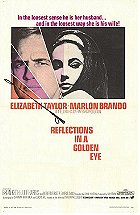 Posted : 13 years, 6 months ago on 28 November 2011 03:58
(A review of Reflections in a Golden Eye)
Posted : 13 years, 6 months ago on 28 November 2011 03:58
(A review of Reflections in a Golden Eye)An enigmatic, overtly ambitious failure of hot-house Southern Gothic tropes, Reflections in a Golden Eye is weirdly hypnotic and maddeningly opaque experience, but it’s always a joy to watch such a group of actors as John Huston managed to line-up for this disaster.
The story is a dark, twisted pile-up of sub-par Tennessee Williams knockoffs engaging in depraved sexual acts and emotionally damaging personal relationships. Given a painterly gauche of sepia, Reflections tells the story of a repressed homosexual army man (Brando), his unfulfilled carnal wife (Elizabeth Taylor), the colonel she’s not even trying to hide her affair with (Brian Keith), and his wife who’s constantly on the precipice of falling into her emotional fragile and disturbed nature (Julie Harris). Into this foursome comes Robert Forster as the man assigned to take care of Taylor’s prized horse, he also happens to have a penchant for being naked in woods.
Brando’s performance can be taken one of two ways: as something utterly brilliant, or as one of the signs that he stopped caring about the quality of his performances early on and buckled under his own genius shortly after The Fugitive Kind. When I first watched the film I left it thinking that, truly, Brando did begin to crack-up and leave behind the brilliance of A Streetcar Named Desire fairly early into his career. But, for all of the film’s problems haunting you with its miserable characters and images isn’t one of them, the more I thought about his character and the reading he gave it, the more I started to appreciate it. This is a man who’s so filled with self-disgust and hatred that he has inverted to the point of inarticulateness within himself. Of course he’s going to mumble and grumble – what else would his inner (and outer) dialog sound like?
And Taylor as the emasculating, shrill harpy of a wife is a real treat. Although her nude scene is purposefully left cold, without any kind of erotic heat or pervy voyeurism to titillate Brando, and the audience by extension. It’s a definitely, aggressively sexual striptease in front of the husband who doesn’t love or lust for her. It’s a detached, clinical display of her taunting him with her luscious form. This is the kind of role that Taylor truly excelled at.
The rest of the cast performs admirably, but they’re left adrift by Carson McCullers fairly ridiculous plotting. And while Huston tries admirably to throw some kind of intrigue and whip up some kind of interest in the whole thing by literally filming it in a golden hue, it becomes more distracting as an obvious technique than anything else. It effectively works in a few scenes to demonstrate how barren and void that their lives are, but sometimes just feels unnecessary and distracting. I respected it for trying something daring, but it would have been better if they tried it out on something more worth the effort.
The story is a dark, twisted pile-up of sub-par Tennessee Williams knockoffs engaging in depraved sexual acts and emotionally damaging personal relationships. Given a painterly gauche of sepia, Reflections tells the story of a repressed homosexual army man (Brando), his unfulfilled carnal wife (Elizabeth Taylor), the colonel she’s not even trying to hide her affair with (Brian Keith), and his wife who’s constantly on the precipice of falling into her emotional fragile and disturbed nature (Julie Harris). Into this foursome comes Robert Forster as the man assigned to take care of Taylor’s prized horse, he also happens to have a penchant for being naked in woods.
Brando’s performance can be taken one of two ways: as something utterly brilliant, or as one of the signs that he stopped caring about the quality of his performances early on and buckled under his own genius shortly after The Fugitive Kind. When I first watched the film I left it thinking that, truly, Brando did begin to crack-up and leave behind the brilliance of A Streetcar Named Desire fairly early into his career. But, for all of the film’s problems haunting you with its miserable characters and images isn’t one of them, the more I thought about his character and the reading he gave it, the more I started to appreciate it. This is a man who’s so filled with self-disgust and hatred that he has inverted to the point of inarticulateness within himself. Of course he’s going to mumble and grumble – what else would his inner (and outer) dialog sound like?
And Taylor as the emasculating, shrill harpy of a wife is a real treat. Although her nude scene is purposefully left cold, without any kind of erotic heat or pervy voyeurism to titillate Brando, and the audience by extension. It’s a definitely, aggressively sexual striptease in front of the husband who doesn’t love or lust for her. It’s a detached, clinical display of her taunting him with her luscious form. This is the kind of role that Taylor truly excelled at.
The rest of the cast performs admirably, but they’re left adrift by Carson McCullers fairly ridiculous plotting. And while Huston tries admirably to throw some kind of intrigue and whip up some kind of interest in the whole thing by literally filming it in a golden hue, it becomes more distracting as an obvious technique than anything else. It effectively works in a few scenes to demonstrate how barren and void that their lives are, but sometimes just feels unnecessary and distracting. I respected it for trying something daring, but it would have been better if they tried it out on something more worth the effort.
 0 comments, Reply to this entry
0 comments, Reply to this entry
Divorce, Italian Style
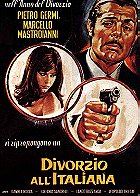 Posted : 13 years, 6 months ago on 28 November 2011 03:57
(A review of Divorce Italian Style)
Posted : 13 years, 6 months ago on 28 November 2011 03:57
(A review of Divorce Italian Style)In a humorous bit of stunt casting, Divorce, Italian Style sees Marcello Mastroianni as an aristocratic married man, trapped by circumstance and general inertia in a life of dwindling wealth and sexual satisfaction, who longs to divorce his wife and shack up with the nubile young sexpot-next-door. None of this seems terribly strange for a Mastroianni character, but it’s the way that the film purposefully subverts this archetype into a running punch line that makes the casting choice so delicious.
The film tells us that it’s easier in Italy for men to kill their wives if they’ve been discovered in a compromising position then it is to divorce them. So, in order to runoff into the beautiful sunset, Mastroianni designs to turn himself into a cuckold, eventually turning his societal shame into personal gain by murdering his wife, Daniela Rocca, looking unattractive but playing the suffocating and devoted wife.
The way that Mastroianni plays his part is absolutely delightful. Pitched somewhere between pretentious Euro-trash sophisticate and Buster Keaton’s great stone face, he thoroughly enacts his plans, meanwhile ignoring the nymphet that he’s trying to throw away his whole life for. Unlike Fellini’s semi-autobiographical stories which featured Mastroianni standing in for the director in a sympathetic light, Divorce paints his character and his deeds as the absolutely sleaziest, distinctly un-self-aware actions in an unsympathetic light. Especially since the film is narrated from his character’s point-of-view. To say that he is an unreliable storyteller is but an understatement.
While it does trade in clichés – the doomed wife is an ignored, lusty, needy; the mistress is incredibly naïve, pure, busty, and ripe with blossoming sexuality – it rackets them far enough into the realm of the absurd to make it bleakly hilarious. Cynical, bitter, and amoral – Divorce, Italian Style is a martial strife masterpiece, anchored by an Oscar nominated performance by Mastroianni.
The film tells us that it’s easier in Italy for men to kill their wives if they’ve been discovered in a compromising position then it is to divorce them. So, in order to runoff into the beautiful sunset, Mastroianni designs to turn himself into a cuckold, eventually turning his societal shame into personal gain by murdering his wife, Daniela Rocca, looking unattractive but playing the suffocating and devoted wife.
The way that Mastroianni plays his part is absolutely delightful. Pitched somewhere between pretentious Euro-trash sophisticate and Buster Keaton’s great stone face, he thoroughly enacts his plans, meanwhile ignoring the nymphet that he’s trying to throw away his whole life for. Unlike Fellini’s semi-autobiographical stories which featured Mastroianni standing in for the director in a sympathetic light, Divorce paints his character and his deeds as the absolutely sleaziest, distinctly un-self-aware actions in an unsympathetic light. Especially since the film is narrated from his character’s point-of-view. To say that he is an unreliable storyteller is but an understatement.
While it does trade in clichés – the doomed wife is an ignored, lusty, needy; the mistress is incredibly naïve, pure, busty, and ripe with blossoming sexuality – it rackets them far enough into the realm of the absurd to make it bleakly hilarious. Cynical, bitter, and amoral – Divorce, Italian Style is a martial strife masterpiece, anchored by an Oscar nominated performance by Mastroianni.
 0 comments, Reply to this entry
0 comments, Reply to this entry
The Switch
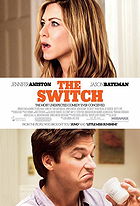 Posted : 13 years, 6 months ago on 28 November 2011 03:57
(A review of The Switch)
Posted : 13 years, 6 months ago on 28 November 2011 03:57
(A review of The Switch)We know from the first moment that Jennifer Aniston and Jason Bateman will wind up together – because if Hollywood wants us to believe anything, it’s this: unless one of them is gay, a man and woman can never be anything but friends. Ever. The Switch tries to offer us something new, a different shade and texture into the romantic comedy formula, but it quickly turns trite and relies upon tired sitcom answers and responses to solve its questions. And since, as a quick Google search as informed me, it was based upon a Jeffrey Eugenides short story, the film’s reliance upon pat answers really spits in the face of not just the audience, but the desecrated source material as well.
Bateman’s inherent likability forces us to tolerate his neurotic asshole of a character. And the script always reminds us through his actions, and the reactions of those around him, that was never truly meant to be easily digestible rom-com fluff. And the ending’s tacked on happy ending creates choppy waters which the film never truly manages to float steadily on. Perhaps it was the casting of Jennifer Aniston that managed to turn this into dark, complicated fair and turned into an ugly step-sister that demands simple resolutions, and for its allegedly smart characters to never utter the one or two lines of dialog that would wrap up the whole conflict until the absolute best time – roughly thirty minutes before it’s supposed to end.
Bateman’s inherent likability forces us to tolerate his neurotic asshole of a character. And the script always reminds us through his actions, and the reactions of those around him, that was never truly meant to be easily digestible rom-com fluff. And the ending’s tacked on happy ending creates choppy waters which the film never truly manages to float steadily on. Perhaps it was the casting of Jennifer Aniston that managed to turn this into dark, complicated fair and turned into an ugly step-sister that demands simple resolutions, and for its allegedly smart characters to never utter the one or two lines of dialog that would wrap up the whole conflict until the absolute best time – roughly thirty minutes before it’s supposed to end.
 0 comments, Reply to this entry
0 comments, Reply to this entry
Elizabeth R
 Posted : 13 years, 8 months ago on 8 October 2011 11:02
(A review of Elizabeth R)
Posted : 13 years, 8 months ago on 8 October 2011 11:02
(A review of Elizabeth R)It seems almost quaint to call Glenda Jackson's performance in this six-part mini-series a tour de force, but if someone ever wanted to view a visual guide to that phrase's definition it would have to look no further than here. It's a daunting enough task to broach a character as monumental and over-used as Elizabeth Tudor, but how would one play her from her early days as a princess to her final moments of introspection before death? The question is answered in this astounding accomplishment of the television medium.
Economic, social, gender, religious and sexual politics crash head-first in the story of Elizabeth's reign as queen, and this series doesn't shy away from them. Each of the six episodes focuses on a specific point in her reign and examines it in thorough detail. But since this is also a fictionalized account, it ties into it a theme or personality quirk of Elizabeth to try and examine and understand her. But make no mistake, this isn't The Tudors, so the series never condescends to its viewers by making the religious monarchs behave like rascally 20th century denizens in ridiculous costumes.
It's a testament to her strength as an actress, and as a presence on-screen that is sorely missed, that Glenda Jackson is able to make us believe in her different versions of Elizabeth, and to make the transitions that her character undergoes utterly seamless and believable. In episode one she is a head-strong, flirtatious and callous teenager, and by the end of episode six she is an iron-willed monarch, prone to level-headed rationalizations, witty and wise in old age. Jackson forsakes any kind of glamor in the role by appearing in old age makeup, looking like living-death when she gets small pox and either wearing a bald cap or shaving her head for scenes in which Elizabeth is left alone in her bedroom. As much as I adore Bette Davis, Cate Blanchett and Helen Mirren, Jackson's politically acrobatic and lioness-in-waiting reading of Elizabeth is quite possibly the definitive filmed version of the character.
And while being filmed in the 70s, it has aged surprisingly little. If there is one strike against it, it is this: the outdoor scenes show wear and tear, their age is obvious since they were filmed on location and have not been cleaned up. The indoor scenes still look incredibly pristine and like they were shot on videotape only a short time ago. This small fault does tend to make the indoor scenes a little less realistic by jarringly taking you out of the action. It's a minor fault, and as each episode goes on you become accustomed to the switch. Aside from this one flaw, Elizabeth R remains a towering achievement for both Glenda Jackson as an actress, filmed portrayals of Queen Elizabeth I, and for the kind of television serials which are rarely being made. I looked forward to purchasing this on DVD and re-watching this rewarding series.
Economic, social, gender, religious and sexual politics crash head-first in the story of Elizabeth's reign as queen, and this series doesn't shy away from them. Each of the six episodes focuses on a specific point in her reign and examines it in thorough detail. But since this is also a fictionalized account, it ties into it a theme or personality quirk of Elizabeth to try and examine and understand her. But make no mistake, this isn't The Tudors, so the series never condescends to its viewers by making the religious monarchs behave like rascally 20th century denizens in ridiculous costumes.
It's a testament to her strength as an actress, and as a presence on-screen that is sorely missed, that Glenda Jackson is able to make us believe in her different versions of Elizabeth, and to make the transitions that her character undergoes utterly seamless and believable. In episode one she is a head-strong, flirtatious and callous teenager, and by the end of episode six she is an iron-willed monarch, prone to level-headed rationalizations, witty and wise in old age. Jackson forsakes any kind of glamor in the role by appearing in old age makeup, looking like living-death when she gets small pox and either wearing a bald cap or shaving her head for scenes in which Elizabeth is left alone in her bedroom. As much as I adore Bette Davis, Cate Blanchett and Helen Mirren, Jackson's politically acrobatic and lioness-in-waiting reading of Elizabeth is quite possibly the definitive filmed version of the character.
And while being filmed in the 70s, it has aged surprisingly little. If there is one strike against it, it is this: the outdoor scenes show wear and tear, their age is obvious since they were filmed on location and have not been cleaned up. The indoor scenes still look incredibly pristine and like they were shot on videotape only a short time ago. This small fault does tend to make the indoor scenes a little less realistic by jarringly taking you out of the action. It's a minor fault, and as each episode goes on you become accustomed to the switch. Aside from this one flaw, Elizabeth R remains a towering achievement for both Glenda Jackson as an actress, filmed portrayals of Queen Elizabeth I, and for the kind of television serials which are rarely being made. I looked forward to purchasing this on DVD and re-watching this rewarding series.
 0 comments, Reply to this entry
0 comments, Reply to this entry
Sweet Bird of Youth
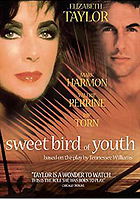 Posted : 13 years, 8 months ago on 8 October 2011 07:37
(A review of Sweet Bird of Youth)
Posted : 13 years, 8 months ago on 8 October 2011 07:37
(A review of Sweet Bird of Youth)This 1989 TV movie version of Sweet Bird of Youth adheres very closely to the original text of the Tennessee Williams play, but is missing something that resonates so deeply with the admirable-but-flawed 1962 movie version. There's plenty of fingers to be pointed as to why the flaws are so predominate, but it could just easily be a case of the individual sums not being strong enough to support the whole. No matter how great those individual sums looked on paper.
Elizabeth Taylor was already a legendary, iconic actress long before 1989, but casting her as an actress who was legendary but fading from the silver screen was an inspired bit of stunt casting. Taylor didn't have to do much in the role, she was the role. But that still doesn't excuse her sometimes lazy performance. Sure, there's moments of absolute brilliance and clarity in her rendering of the character, but the first chunk of the film is all campy affectations and Taylor relying upon her indomitable star power and not her acting chops.
But whoever decided that casting Mark Harmon was a good idea needs a good beating. While, yes, he is quite attractive to behold (and a nude scene early in the film is quite delicious), he does look every bit his 38 years at the time of filming. He brings nothing of the self-loathing, desperation and innate charisma that is required of the character. He's blandly there with an affected and bad accent hogging up precious screen time.
While the brutality and violence, isolation and sexual despair that the characters experience and cause each other to have adheres strictly to the text, this version oddly removes or reduces many of the secondary characters. Rip Torn gets the short-end of the stick by appearing as Boss Finley. The part is so underwritten in this version of the story that we wonder why he even bothered to show up at all. The whole storyline about Finley's white-washing of his family secrets to become a demagogic politician added a much needed bit of biting social commentary about the wider world. Sure, Taylor and Harmon's characters are symbolic of a kind of rot that can happen, but Finley was there to show how it crept in at the top and worked its way into every facet. It's a shame that so much of that story was removed as it also added to the characterization of Harmon's character.
And, lastly, there's the problem of the director: Nicholas Roeg. A director whose best work is narratively and visually complex and intricate here gets lazy and turns the whole thing into some kind of gauzy soap opera. Much of the true sex, violence and juicy stuff in the story happens off-screen and we're only told about it later. Why? In The Man Who Fell to Earth we're treated to David Bowie's alien becoming acquainted with every vice that mankind took centuries to master. He's done better work before and since this misfire. So we'll just chalk this one up to the fact that not every artist can create a masterpiece every time.
Elizabeth Taylor was already a legendary, iconic actress long before 1989, but casting her as an actress who was legendary but fading from the silver screen was an inspired bit of stunt casting. Taylor didn't have to do much in the role, she was the role. But that still doesn't excuse her sometimes lazy performance. Sure, there's moments of absolute brilliance and clarity in her rendering of the character, but the first chunk of the film is all campy affectations and Taylor relying upon her indomitable star power and not her acting chops.
But whoever decided that casting Mark Harmon was a good idea needs a good beating. While, yes, he is quite attractive to behold (and a nude scene early in the film is quite delicious), he does look every bit his 38 years at the time of filming. He brings nothing of the self-loathing, desperation and innate charisma that is required of the character. He's blandly there with an affected and bad accent hogging up precious screen time.
While the brutality and violence, isolation and sexual despair that the characters experience and cause each other to have adheres strictly to the text, this version oddly removes or reduces many of the secondary characters. Rip Torn gets the short-end of the stick by appearing as Boss Finley. The part is so underwritten in this version of the story that we wonder why he even bothered to show up at all. The whole storyline about Finley's white-washing of his family secrets to become a demagogic politician added a much needed bit of biting social commentary about the wider world. Sure, Taylor and Harmon's characters are symbolic of a kind of rot that can happen, but Finley was there to show how it crept in at the top and worked its way into every facet. It's a shame that so much of that story was removed as it also added to the characterization of Harmon's character.
And, lastly, there's the problem of the director: Nicholas Roeg. A director whose best work is narratively and visually complex and intricate here gets lazy and turns the whole thing into some kind of gauzy soap opera. Much of the true sex, violence and juicy stuff in the story happens off-screen and we're only told about it later. Why? In The Man Who Fell to Earth we're treated to David Bowie's alien becoming acquainted with every vice that mankind took centuries to master. He's done better work before and since this misfire. So we'll just chalk this one up to the fact that not every artist can create a masterpiece every time.
 0 comments, Reply to this entry
0 comments, Reply to this entry
The Unusuals
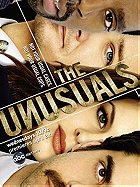 Posted : 13 years, 8 months ago on 6 October 2011 11:12
(A review of The Unusuals)
Posted : 13 years, 8 months ago on 6 October 2011 11:12
(A review of The Unusuals)I wanted to LOVE The Unusuals. I wanted to lament it's cancellation and decry that dreck like Two and a Half Men still infects the airwaves. But I found the show to be more shrug-worthy. If this is supposed to be a satire of your typical police procedural, it needed to go for it harder, better and truly commit. If this is supposed to be a more straight-laced police procedural with a healthy dose of quirk, then it just never congealed correctly.
The biggest problems with the show are evident in the pilot, and never truly get addressed or even dealt with. But it's hard to deal with a problem when the problem is the casting choice of your lead actress. Amber Tamblyn, as likable as she may be, is never for one second believable as a New York City cop. In fact, she wouldn't be believable as a cop in any city. She's so soft, sweet and dewy that it verges on the comical to watch her try and fight a criminal, or play tough with the boys. She's like someone's younger sister who dropped in to play with the cooler, older, more bad-ass kids. It never works. (Of course, she's also handicapped by written as slow-witted to the point of distraction. It's not intentional, but things that are easily sign-posted to the audience seem like unimaginable, tenuous at best, connections to her character. She would have been let go from the force after 30 minutes in the real world.)
The rest of the cast tries to give it their collective all, but they can't elevate the material that they're given to work with. Fancy tricks in editing like giving you high velocity music and frantic editing to try and enliven the pace and tone of the show are easily discernible smoke-and-mirrors. The scripts try to wring out drama and pathos for their characters, but everything always ends up being too pat and neatly resolved. There's never any sense that these characters are ever in any true danger. The storylines hit every cop-show cliche with an elan that makes you think that the writers don't know that they're dropping into predictability so easily.
It's of interest because it's straining for a quirky tone, but beneath the pristine (but, and we're beaten with this over-the-head in dialog numerous times, deeply corrupt) police station that's really all that there is to this show. What a pity, it had a great cast.
The biggest problems with the show are evident in the pilot, and never truly get addressed or even dealt with. But it's hard to deal with a problem when the problem is the casting choice of your lead actress. Amber Tamblyn, as likable as she may be, is never for one second believable as a New York City cop. In fact, she wouldn't be believable as a cop in any city. She's so soft, sweet and dewy that it verges on the comical to watch her try and fight a criminal, or play tough with the boys. She's like someone's younger sister who dropped in to play with the cooler, older, more bad-ass kids. It never works. (Of course, she's also handicapped by written as slow-witted to the point of distraction. It's not intentional, but things that are easily sign-posted to the audience seem like unimaginable, tenuous at best, connections to her character. She would have been let go from the force after 30 minutes in the real world.)
The rest of the cast tries to give it their collective all, but they can't elevate the material that they're given to work with. Fancy tricks in editing like giving you high velocity music and frantic editing to try and enliven the pace and tone of the show are easily discernible smoke-and-mirrors. The scripts try to wring out drama and pathos for their characters, but everything always ends up being too pat and neatly resolved. There's never any sense that these characters are ever in any true danger. The storylines hit every cop-show cliche with an elan that makes you think that the writers don't know that they're dropping into predictability so easily.
It's of interest because it's straining for a quirky tone, but beneath the pristine (but, and we're beaten with this over-the-head in dialog numerous times, deeply corrupt) police station that's really all that there is to this show. What a pity, it had a great cast.
 0 comments, Reply to this entry
0 comments, Reply to this entry
Prizzi's Honor
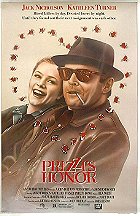 Posted : 13 years, 9 months ago on 27 September 2011 04:31
(A review of Prizzi's Honor)
Posted : 13 years, 9 months ago on 27 September 2011 04:31
(A review of Prizzi's Honor)So much of John Huston’s career was a series of big-ideas dramatic films about groups of people banding together and forming a kind of destructive alliance, that it makes perfect sense that towards the end he would turn that thematic obsession into a dark comedy about the Mafia and romance. In his first film, The Maltese Falcon, Huston perfectly captured Dashiell Hammett’s acidic droll, it was a meeting of two artists with similar ideals and tastes. In Prizzi’s Honor, Huston continues that tradition of baroque humor in depicting the love triangle at the heart of the story.
Unlike The Godfather, which also told the story of one family’s tarnished reputation and eventual return to prominence in the underworld, the main thrust and tone of Prizzi’s Honor is not some elegiac tribute to the family. Instead we focus in on the adoptive son of the Prizzi crime family, Charley Partanna (Jack Nicholson). Charley is the main thug and killer for the family, a man who’s brain power is, shall we say, limited at best. At a family wedding he meets a beautiful woman named Irene (Kathleen Turner), and runs into his jilted ex-lover, the Don’s granddaughter Maerose (Anjelica Huston). The beautiful woman is a killer-for-hire and a thief, and much of the movie’s tension comes from this fact. That, and Anjelica Huston’s scheming, bruised pride being harnessed into taking the two of them out as a form of ego-boosting (hers is, without a doubt, the best in the entire movie).
It all sounds far more serious than it is. The pitch-black comedy comes in thick, like the scene where Turner and Nicholson are making dinner plans while disposing of the bodies that have accumulated after their latest killing. Or the way that Huston’s character pretends to have black eyes in order to frame Nicholson for taking advantage of her. But nothing hits the subversive streak quite like the fact that Nicholson and Turner get contracted to murder each other. Before Brad Pitt and Angelina Jolie were sexing up the screen in Mr. & Mrs. Smith, Prizzi’s Honor was giving you confused giggles over a matrimonial strife.
Unlike The Godfather, which also told the story of one family’s tarnished reputation and eventual return to prominence in the underworld, the main thrust and tone of Prizzi’s Honor is not some elegiac tribute to the family. Instead we focus in on the adoptive son of the Prizzi crime family, Charley Partanna (Jack Nicholson). Charley is the main thug and killer for the family, a man who’s brain power is, shall we say, limited at best. At a family wedding he meets a beautiful woman named Irene (Kathleen Turner), and runs into his jilted ex-lover, the Don’s granddaughter Maerose (Anjelica Huston). The beautiful woman is a killer-for-hire and a thief, and much of the movie’s tension comes from this fact. That, and Anjelica Huston’s scheming, bruised pride being harnessed into taking the two of them out as a form of ego-boosting (hers is, without a doubt, the best in the entire movie).
It all sounds far more serious than it is. The pitch-black comedy comes in thick, like the scene where Turner and Nicholson are making dinner plans while disposing of the bodies that have accumulated after their latest killing. Or the way that Huston’s character pretends to have black eyes in order to frame Nicholson for taking advantage of her. But nothing hits the subversive streak quite like the fact that Nicholson and Turner get contracted to murder each other. Before Brad Pitt and Angelina Jolie were sexing up the screen in Mr. & Mrs. Smith, Prizzi’s Honor was giving you confused giggles over a matrimonial strife.
 0 comments, Reply to this entry
0 comments, Reply to this entry
Enemies, A Love Story
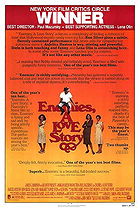 Posted : 13 years, 9 months ago on 23 September 2011 06:53
(A review of Enemies: A Love Story (1989))
Posted : 13 years, 9 months ago on 23 September 2011 06:53
(A review of Enemies: A Love Story (1989))Complicated and hardened out of the civilian causalities and atrocities of WWII, the characters in Enemies, A Love Story present an idiosyncratic answer to easily digestible happy-shiny Holocaust survivor tales. These people are damaged, but most of them have managed to rise above the ashes of their destroyed lives and rebirth themselves as members in a society. How functional they are is entirely debatable.
It tells the story of a quadrilateral relationship between a man who survived the Holocaust by hiding in a hay loft thanks to his housekeeper, who he has now remarried out of gratitude more than anything, his mistress, who survived the concentration camps but never made it completely out, and his ex-wife, whom we are told died in the concentration camps before she comes barreling into the story with a caustic humor and need to get on with things. He loves all three of them, and how could you not? They’re all beautiful, intelligent and engaging women. It would be foolish NOT to love all three of them.
But each relationship gives him as much satisfaction, in every sense of the word, as it does neurosis and anxiety. Lena Olin, as his mistress located in the Bronx, starts the film as a sensual, highly erotic woman who seems to have a touch of darkness around the sides. As the film progress we learn her dark secrets and she becomes more and more unhinged. Margaret Sophie Stein is the housekeeper-turned-wife; she worships at her husband’s feet as a way of coping with the fact that he won’t allow her to have a child. Anjelica Huston is the wife whom he was told died in the camps. Her character is both caustic and filled with warmth since she sees the flaws and strengths in all of the characters and accepts them for who they truly are.
And Ron Silver stars as Herman, a man who is afraid of happiness. He is a victim of his own making, made worse by hiding out in the hayloft while everyone he knew and loved died all around him. Happiness has no value or meaning from him since he’s never known how or why it exists. We know very little about him, except what we learn by proxy from the women in his life. Or should that be lives, since he mercurially shifts from one set of personalities to another depending on which one he is with?
It should go without saying that the acting is of the very finest quality, but I shall say it anyway. Olin and Huston in particular hit upon something very special with their character readings. But it’s the way that the film never drips into saccharine sentimentality or descends into some kind of grand guignol psychological cluster-fuck that truly makes it something special. It alternates between darkly comic moments and believably warm and humane scenes perfectly. It has an essence of lives being lived and trying to be picked-up and moved along with.
And, at the end, all we can say is that every character gets exactly what they deserve either by fate’s trickery or designs of their own making.
It tells the story of a quadrilateral relationship between a man who survived the Holocaust by hiding in a hay loft thanks to his housekeeper, who he has now remarried out of gratitude more than anything, his mistress, who survived the concentration camps but never made it completely out, and his ex-wife, whom we are told died in the concentration camps before she comes barreling into the story with a caustic humor and need to get on with things. He loves all three of them, and how could you not? They’re all beautiful, intelligent and engaging women. It would be foolish NOT to love all three of them.
But each relationship gives him as much satisfaction, in every sense of the word, as it does neurosis and anxiety. Lena Olin, as his mistress located in the Bronx, starts the film as a sensual, highly erotic woman who seems to have a touch of darkness around the sides. As the film progress we learn her dark secrets and she becomes more and more unhinged. Margaret Sophie Stein is the housekeeper-turned-wife; she worships at her husband’s feet as a way of coping with the fact that he won’t allow her to have a child. Anjelica Huston is the wife whom he was told died in the camps. Her character is both caustic and filled with warmth since she sees the flaws and strengths in all of the characters and accepts them for who they truly are.
And Ron Silver stars as Herman, a man who is afraid of happiness. He is a victim of his own making, made worse by hiding out in the hayloft while everyone he knew and loved died all around him. Happiness has no value or meaning from him since he’s never known how or why it exists. We know very little about him, except what we learn by proxy from the women in his life. Or should that be lives, since he mercurially shifts from one set of personalities to another depending on which one he is with?
It should go without saying that the acting is of the very finest quality, but I shall say it anyway. Olin and Huston in particular hit upon something very special with their character readings. But it’s the way that the film never drips into saccharine sentimentality or descends into some kind of grand guignol psychological cluster-fuck that truly makes it something special. It alternates between darkly comic moments and believably warm and humane scenes perfectly. It has an essence of lives being lived and trying to be picked-up and moved along with.
And, at the end, all we can say is that every character gets exactly what they deserve either by fate’s trickery or designs of their own making.
 0 comments, Reply to this entry
0 comments, Reply to this entry
 Login
Login
 Home
Home 95 Lists
95 Lists 1531 Reviews
1531 Reviews Collections
Collections